With so many flowering shrubs and perennials available, how do you choose? I expect a lot from my plants, and they certainly have to do far more than just give me pretty flowers for a few weeks. For my own garden, I look for attributes like deer resistance and drought tolerance, but my clients typically seek plants that are low maintenance and have a long bloom period.
The selections below meet at least some of those requirements. Which ones will be on your wish list this year?
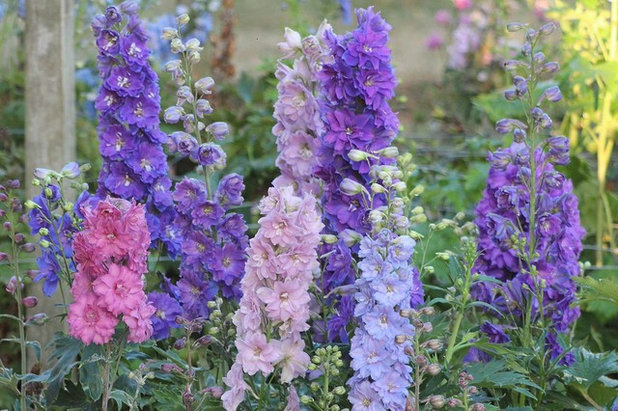
PerennialResource.com
Dwarf Stars DelphiniumI find it impossible to walk past delphiniums, either in the nursery or in a garden, without stopping. There is something about those majestic spires in shades of blue, lavender and pink that makes me want to throw caution to the wind and add dozens of these romantic perennials to my garden.
Yet my personal favorites — the Pacific Giants — are far from low maintenance. True to their name, these 6- to 8-foot-tall flowering stems need to be tied to stakes several times during the growing season, then cut down to encourage reblooming. Due to their sheer stature, they are always planted at the back of the border, which is a challenge to reach in midsummer.
Dwarf Stars changes all that. At just 2½ feet tall, it can be grown closer to the front of the border and does not need staking — even in windy situations.
Botanical name: Delphinium ‘Dwarf Stars’
Origin: Garden hybrid
Where it will grow: Hardy to -40 degrees Fahrenheit (USDA zones 3 to 7; find your zone)
Water requirement: Average
Light requirement: Full sun
Mature size: 2½ feet tall and 18 inches wide
Benefits and tolerances: Deer and rabbit resistant; attracts hummingbirds and butterflies
Seasonal interest: Summer
When to plant: Spring
Distinguishing traits: Makes a great cut flower; has a dwarf form; suitable for windy locations; does not need staking
Planting notes: Plant in fertile, well-drained soil; use as part of a romantic English garden design, within a traditional mixed border or in a cutting garden
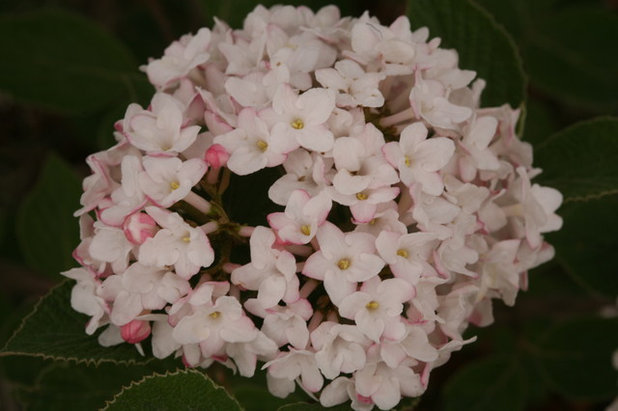
Proven Winners
Spice Ball Korean Spice ViburnumThe same old-fashioned flowers and spicy fragrance of our grandparents’ shrub but on a more compact plant — that’s what Spice Ball brings to today’s gardener. It is well suited to smaller landscapes and is a stronger grower than other dwarf varieties.
Botanical name: Viburnum carlesii ‘Spice Ball’
Origin: Garden hybrid
Where it will grow: Hardy to -30 degrees Fahrenheit (zones 4 to 8)
Water requirement: Average
Light requirement: Full sun to partial sun
Mature size: To 5 feet tall and wide
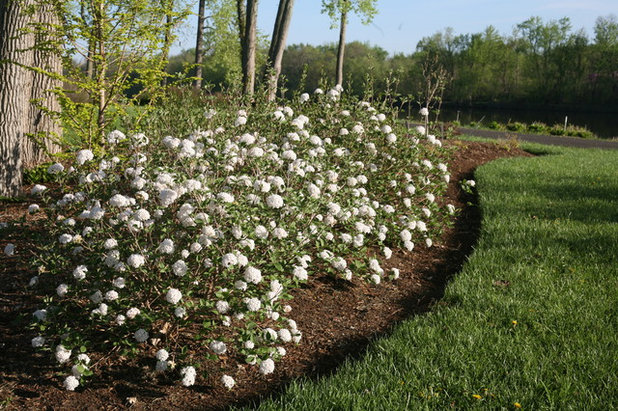
Proven Winners
Benefits and tolerances: Deer resistant (although deer may nibble the flower buds)
Seasonal interest: Spring through fall
When to plant: Spring or fall
Distinguishing traits: Spicy fragrance; compact; stronger growing than other dwarf varieties; low maintenance
Planting notes: Plant in moist, well-drained soil; prune immediately after flowering if desired, although it should not be necessary
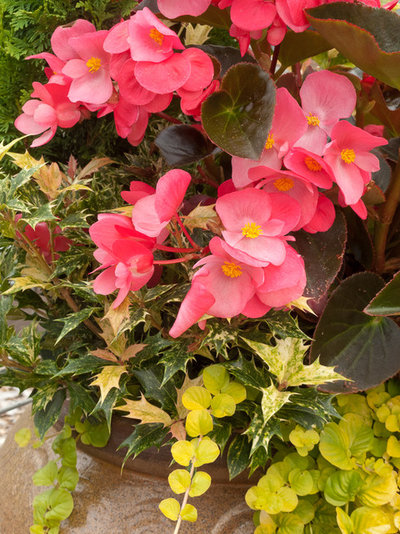
Le jardinet
Surefire Rose BegoniaI’m not a fan of wax leaf begonias. My experience has been that they have a rather gangly appearance, the succulent-type foliage can become diseased, and they are very prone to sunburn, so they have to be coddled in a shady spot.
When I was asked to test this variety last summer, I was less than excited. I planted it in my least favorite container, added a few leftover plants to keep it company and figured I’d give it a real test by growing it in full sun just as the label claimed I could.
I admit it: I was impressed. This 4-inch begonia grew to a well-branched mound 18 inches across; it never once scorched in the sun; it bloomed continuously from May until October; and the bronze foliage was lovely.
Botanical name: Begonia benariensis ‘Surefire Rose’
Origin: Garden hybrid
Where it will grow: Hardy to 30 degrees Fahrenheit (zones 10 to 11); enjoy as a summer annual elsewhere
Water requirement: Average to low
Light requirement: Full sun to partial sun
Mature size: 18 to 24 inches tall and wide
Benefits and tolerances: Sun and heat tolerant
Seasonal interest: Summer
When to plant: Spring
Distinguishing traits: Long bloom time; disease free; colorful foliage; no deadheading necessary (although since it drops its old flowers daily, they do make a bit of a mess)
Planting notes: Use it in the landscape as a bedding plant for a mass of color or include it in container designs.
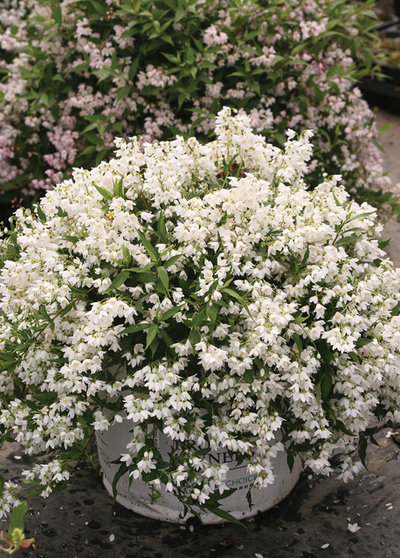 Yuki Snowflake Deutzia
Yuki Snowflake DeutziaThis spring beauty has so many flowers that the foliage is almost hidden from view — just one of several improvements over the well-known Nikko. Yuki Snowflake has a compact and dwarf habit, so it will fit into the smallest of gardens.
Botanical name: Deutzia ‘Yuki Snowflake’
Origin: Garden hybrid
Where it will grow: Hardy to -20 degrees Fahrenheit (zones 5 to 8)
Water requirement: Average
Light requirement: Full sun to partial sun
Mature size: 2 feet tall and wide
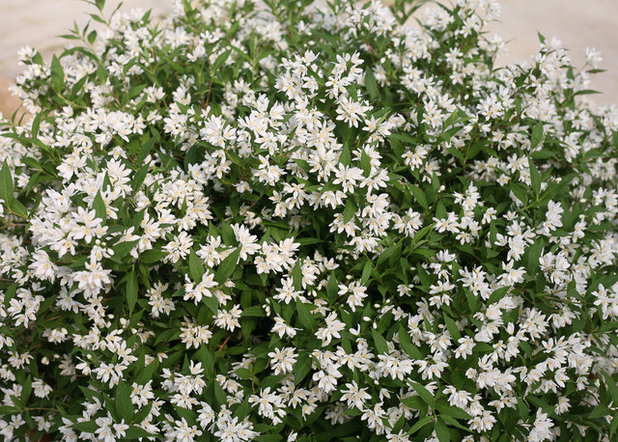 Benefits and tolerances:
Benefits and tolerances: Deer resistant
Seasonal interest: Spring and fall
When to plant: Spring or fall
Distinguishing traits: Abundant white flowers in spring; fall color; compact form
Planting notes: Plant it in moisture-retentive, well-drained soil; it makes a beautiful addition to the spring garden.
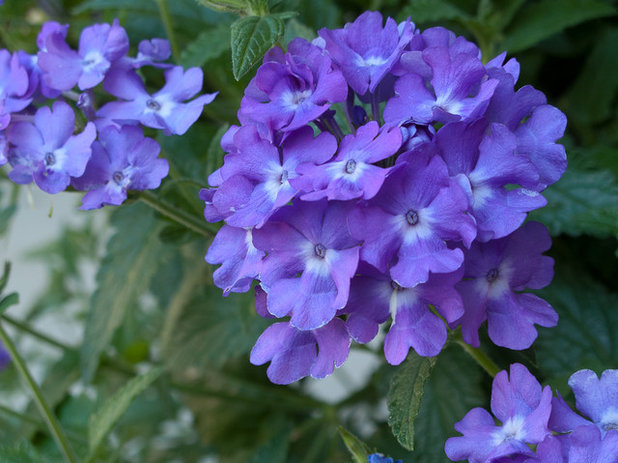
Le jardinet
Superbena ‘Violet Ice’Superbena is a verbena that has been developed to be more vigorous, heat tolerant and mildew resistant than older varieties, and the color Violet Ice is the latest in the series. A quick Internet search for this hybrid will bring up photographs that show the color ranging from shades of magenta and purple to dark blue, yet in my own container the color shown here is a true representation.
Violet Ice bloomed profusely in full sun with larger-than-average flowers in my garden. I trimmed it back a couple of times, as it got very big, which made it bloom all the more. The tag suggested it would also grow well in partial sun, but I have to disagree — I had very poor flowering when the plant received only four hours of afternoon sun.
Botanical name: Verbena hybrid
Origin: Garden hybrid
Where it will grow: Hardy to 10 degrees Fahrenheit (zones 8 to 11); use as an annual elsewhere
Water requirement: Average to low
Light requirement: Full sun for best performance
Mature size: 12 to 16 inches tall and up to 30 inches wide
Benefits and tolerances: Drought tolerant; deer resistant; attracts butterflies
Seasonal interest: Summer
When to plant: Spring
Distinguishing traits: Disease resistant; larger flowers and longer bloom time than many verbena
Planting notes: Use it in a large mixed container or as a colorful, drought-tolerant ground cover
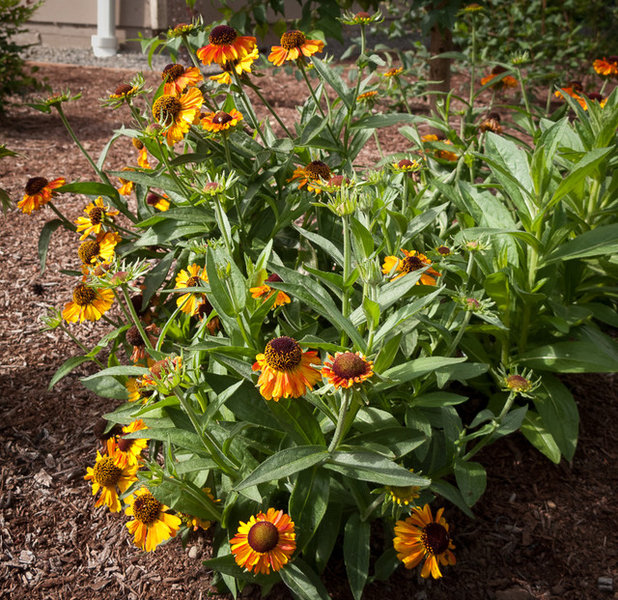
Le jardinet
Short and Sassy SneezeweedI discovered the perennial sneezeweed (also called Helen’s flower) several years ago, and often use it as an alternative to black-eyed Susan (
Rudbeckia). The taller varieties do have a tendency to fall over if not staked, however, and flowering can be quite late in the season.
Short and Sassy proved to have a much better attitude — nice and compact, and it pushed out vivid orange- and yellow-splashed flowers from early June until after a hard frost in late October.
Botanical name: Helenium ‘Short and Sassy’
Origin: Garden hybrid
Where it will grow: Hardy to -30 degrees Fahrenheit (zones 4 to 8)
Water requirement: Average to low
Light requirement: Full sun
Mature size: 18 inches tall and 24 inches wide
Seasonal interest: Summer
When to plant: Spring or fall
Distinguishing traits: Compact; long bloom time; low maintenance
Planting notes: Enjoy this at the front of a garden border or in a container.





